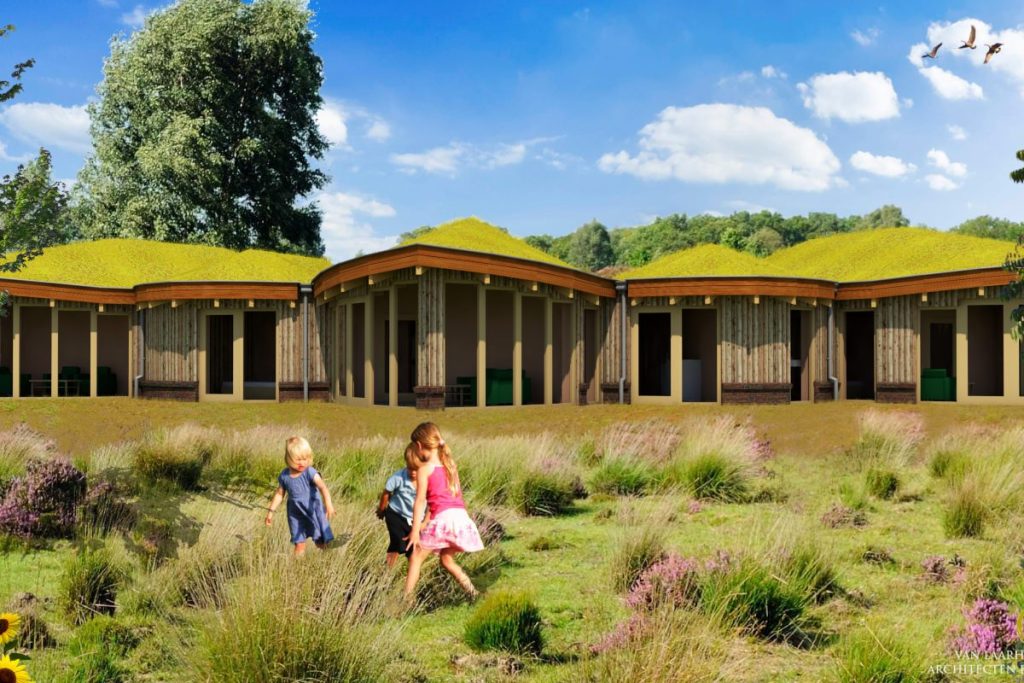
Ecological Village in the Netherlands: Road to Self-Sufficiency with EU Support
Ecological, sustainable, and self-sufficient – the village of Beukel in the Netherlands adheres to these values. This place values water resources and uses wood and hemp in construction, respecting environmental principles.
From above, the houses in the eco-village of Böckel resemble bright flowers in a garden. This village exemplifies sustainable living and is one of the cleanest places in the Netherlands. The creation of this unique eco-village was made possible thanks to the joint efforts of the European Union and local authorities, who allocated funds for its development.
The settlement of Böckel embodies the principles of eco-friendliness, sustainability and self-sufficiency. It implements innovative approaches to life that minimize the negative impact on the environment and conserve resources.
Each house in the settlement is made using environmentally friendly materials such as wood and hemp. These materials have excellent thermal insulation properties, which makes buildings more energy efficient and helps retain heat inside homes. In addition, the buildings are equipped with modern technologies for collecting and recycling rainwater, which allows efficient use of water resources and not wasting a drop of water.
One of the key aspects of life in the Böckel settlement is the desire for self-sufficiency. Residents of the settlement work to create their own food by growing vegetables and fruits in a “forest garden.” This approach makes the community less dependent on outside food supplies and promotes nutritional sustainability.
In addition, the settlement actively uses solar panels to produce energy. The energy accumulated through solar panels is used to heat houses and other needs of the settlement. This circular approach to energy use helps reduce carbon emissions and make communities greener.
The settlement of Böckel not only provides a comfortable living environment for its residents, but also serves as an example for other communities and regions striving for a greener and more sustainable future.
In addition to the aforementioned principles of eco-friendliness, sustainability and self-sufficiency, the village of Böckel is actively involved in the global initiative to create environmentally sustainable communities. This project not only puts innovative solutions into practice, but also ensures the exchange of experience and knowledge with other similar communities around the world.
One of the key elements to the success of the Böckel settlement lies in cooperation with local and international partners. Support from the European Union, local authorities and other organizations plays an important role in the financing and development of the project. This confirms the importance of global cooperation in solving environmental and climate problems.
The settlement of Böckel also actively conducts educational and information events, inviting specialists and researchers to exchange knowledge and experience. These initiatives promote environmental and sustainability best practices.

Research and observation of the Böckel ecovillage allows us to identify effective methods and solutions that can be applied in other places. This experience can be a valuable source of inspiration for other communities who are also looking to improve their environmental footprint and create a sustainable future.
An example of sustainable living: Ecovillage Böckel and its innovations
Ad Vlems, Community Management Manager at Böckel, emphasizes: “By 2030, half the world’s population will face challenges related to climate change. We aim to be self-sufficient in food, water and energy. Böckel is part of a global initiative to create sustainable settlements where sustainability is a top priority.”
The settlement has 36 innovative apartments, where 48 adults live permanently, sharing the principles of a circular economy. One of the long-time residents of this ecological enclave is Annemarie. She has lived in Böckel for more than a year and a half. Her own home was built using biomaterials such as wood and hemp. Annmarie states: “Hemp is an excellent building material that not only provides excellent insulation, but also contributes to a healthier atmosphere inside the home. Our buildings also have the ability to absorb more carbon dioxide than they release into the atmosphere. In addition, we have an amazing “forest garden” where we grow food, providing all 50 inhabitants of the settlement with fresh vegetables and fruits”
The residents of Böckel manage their own “forest garden”, placing fruit and vegetable plants among the trees and shrubs. This makes the garden more resilient to changing weather conditions such as heavy rains, droughts and heat.
The total budget for the ecological settlement project is 10 million euros, of which 2.5 million are provided by the province of North Brabant, another 1 million is allocated as part of the European Union’s cohesion policy, and another 500 thousand euros are received from the Dutch Ministry of Energy and Climate.
Böckel also serves as the site for various innovations, such as the Cesar heating system, which collects and stores the energy produced by 600 solar panels. Honnie van der Vorst, the village’s public relations officer, says: “Our heating system heats a special storage facility to 450 degrees and then uses this heat to warm the floors of the houses. This is an example of a circular approach and a system that does not emit carbon dioxide in atmosphere.”
The settlement of Böckel has already received several awards for its contribution to green construction and sustainable living. This is a place where they are actively working on the future, preparing for the challenges of tomorrow.